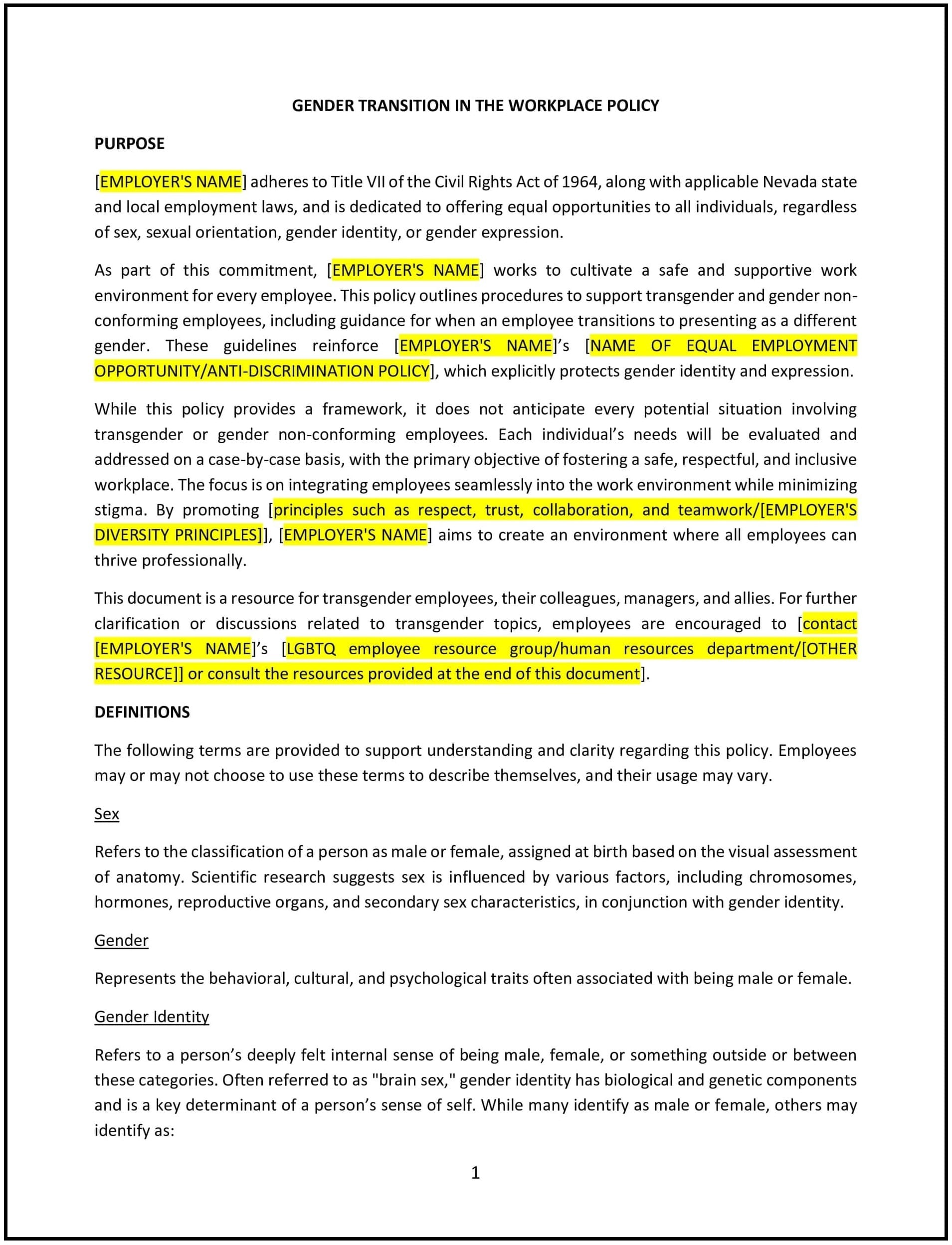Gender transition in the workplace policy (Nevada): Free template
Got contracts to review? While you're here for policies, let Cobrief make contract review effortless—start your free review now.

Customize this template for free
Gender transition in the workplace policy (Nevada)
This gender transition in the workplace policy is designed to help Nevada businesses support employees undergoing a gender transition. It outlines guidelines for fostering a respectful, inclusive, and supportive work environment while ensuring the company complies with state and federal anti-discrimination laws.
By adopting this policy, businesses can promote equality, protect employee rights, and enhance workplace morale and inclusivity.
How to use this gender transition in the workplace policy (Nevada)
- Define the purpose of the policy: Explain that the policy is intended to provide support and guidance for employees undergoing a gender transition, as well as to outline expectations for respectful behavior from all employees.
- Set clear anti-discrimination guidelines: Reinforce the company’s commitment to preventing discrimination, harassment, or retaliation against employees based on gender identity or expression.
- Provide a point of contact: Designate a specific person or department (e.g., HR or a diversity officer) as the point of contact for employees to discuss their needs or concerns related to a gender transition.
- Offer confidentiality: Emphasize that discussions regarding an employee’s gender transition will be kept confidential, and information will only be shared with relevant parties on a need-to-know basis and with the employee’s consent.
- Develop an individual transition plan: Collaborate with the transitioning employee to create a transition plan, which may include updates to workplace records, communication plans for coworkers, and adjustments to uniforms or facilities.
- Update workplace documents: Ensure that workplace systems, such as email accounts, IDs, and personnel files, are updated to reflect the transitioning employee’s name and gender, as appropriate.
- Establish guidelines for facilities usage: Outline how employees can access restrooms and other facilities that align with their gender identity. Make accommodations, such as gender-neutral restrooms, available when needed.
- Provide education and training: Offer training to employees and managers on inclusivity, gender identity, and the importance of respect in the workplace.
Benefits of using this gender transition in the workplace policy (Nevada)
This policy provides several key benefits for Nevada businesses:
- Promotes inclusivity: By supporting employees during a gender transition, businesses foster a culture of respect and inclusivity.
- Enhances employee well-being: Providing a supportive environment helps transitioning employees feel valued and respected, boosting their morale and productivity.
- Reduces legal risks: Compliance with Nevada’s anti-discrimination laws and federal regulations helps businesses avoid legal challenges related to gender identity discrimination.
- Strengthens company reputation: Demonstrating a commitment to inclusivity can enhance the company’s reputation as a supportive and progressive workplace.
- Improves team cohesion: Encouraging education and open communication reduces misunderstandings and fosters a collaborative and respectful workplace culture.
Tips for using this gender transition in the workplace policy (Nevada)
- Communicate the policy effectively: Ensure all employees are aware of the policy and understand the company’s expectations for inclusivity and respect in the workplace.
- Provide support resources: Offer resources, such as access to an Employee Assistance Program (EAP) or local LGBTQ+ organizations, to support transitioning employees.
- Monitor compliance: Regularly assess workplace practices to ensure they align with the policy and Nevada’s anti-discrimination laws.
- Encourage open dialogue: Foster an environment where employees feel comfortable discussing concerns related to gender identity or transition without fear of judgment or retaliation.
- Update the policy as needed: Review and update the policy periodically to reflect changes in laws, workplace practices, or employee needs.